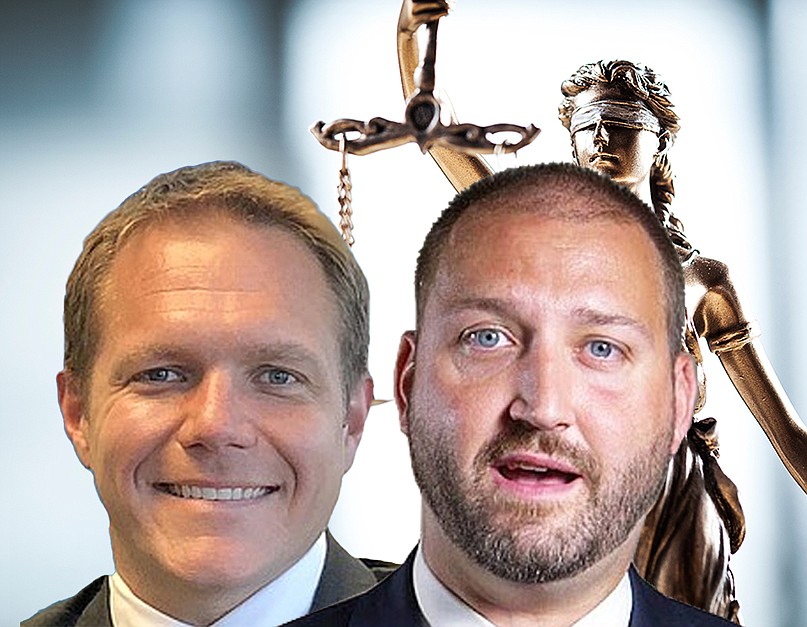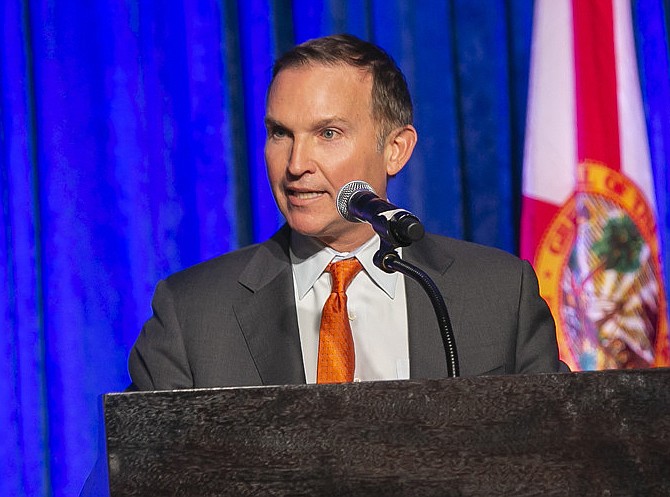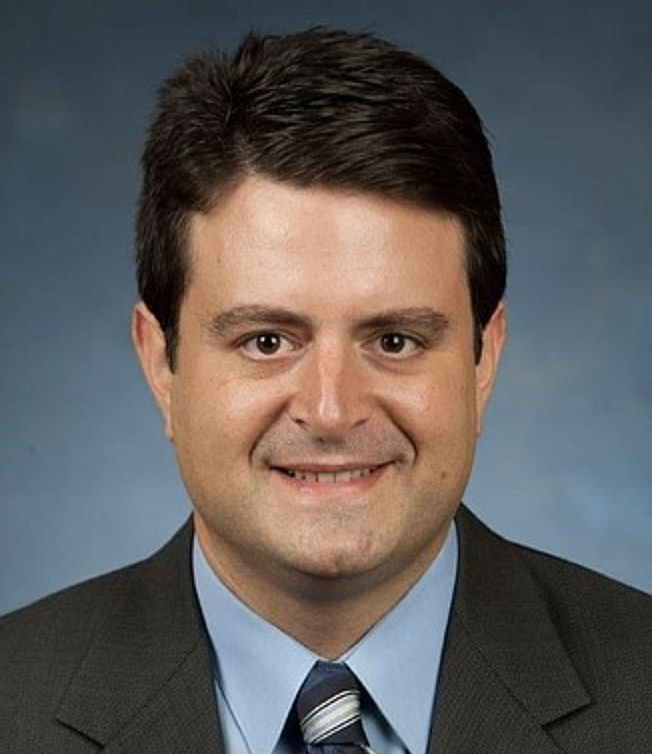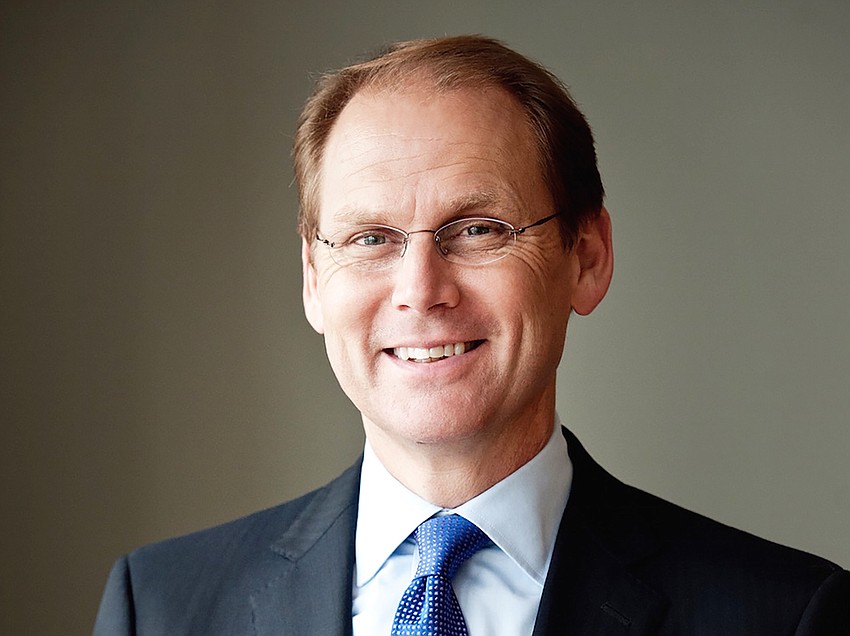
A government witness in the criminal trial of former JEA executives Aaron Zahn and Ryan Wannemacher testified that Zahn told him the mayor was supportive of Zahn receiving a bonus of up to $40 million through a sale of the city-owned utility.
Stephen Amdur, a mergers and acquisitions attorney for a law firm that was hired to help sell JEA, testified March 6 that Zahn offered the information about the bonus during a telephone call in May 2019.
Two months after that call, the JEA board launched a potential sale of the utility and approved an incentive plan that, according to prosecutors, would have paid Zahn and Wannemacher tens of millions of dollars.

Amdur, who attended Yale with Zahn and was housemates with him during their senior year, didn’t identify the mayor by name. Jacksonville’s mayor in 2019 was Lenny Curry, who appointed Zahn to the JEA board of directors in 2018. Two months after joining the board, Zahn resigned his seat to become JEA’s interim and later the permanent CEO.
Asked by Assistant U.S. attorney Tysen Duva what he thought about Curry’s remark, Amdur described taking a wait-and-see approach.
“I thought to myself, there’s a lot of things that would have to happen for that (bonus) to get through ... and I have no say if that’s right, wrong or otherwise,” he said.
Prosecutors claim Zahn and Wannemacher plotted to create what was known as the Performance Unit Plan, or PUP, which was presented to the board as an employee incentive plan available to JEA’s 2,000-plus member workforce.
The government alleges that the defendants knew the performance units would pay them lavish bonuses in a sale of JEA and schemed to deceive the board into approving the PUP and privatizing the utility.
Many ways for a bonus
Under cross-examination by Zahn attorney Eddie Suarez, Amdur said there were several potential ways for Zahn and Wannemacher to receive bonuses from a sale of JEA beyond the PUP. He agreed with Suarez that the mechanisms included being given stock in the company that bought JEA. Another possibility involved the men being hired to head up a subsidiary of the purchasing company and being given signing bonuses.
Also under questioning from Suarez, Amdur said he didn’t believe Zahn was discussing anything illegal and didn’t expressly tell him to keep quiet about the conversation.
“I didn’t think it was something I should shout from the rooftops,” he testified.
Amdur also testified about the efforts of his firm – Pillsbury Winthrop Shaw Pittman of New York City – to obtain a “success” fee, or a bonus for helping facilitate the JEA sale. As Amdur explained it, the fee would come on top of the $5 million to $6 million that the firm billed the city and JEA for its services.
Former city General Counsel Jason Gabriel testified earlier in the trial that JEA executives pressured him to approve the success fee, which he did not believe was appropriate for the government sector.
On March 5, Gabriel recounted a meeting in which former JEA Chief Administrative Officer Herschel Vinyard showed up unexpectedly in his office with an attorney who backed the fee. Gabriel said he had grown tired of discussing the fee and was annoyed that the two had come to him unannounced.
‘Stupid ideas’
Gabriel previously testified that he was not informed about the magnitude of the PUP bonuses until months after the plan was passed in July 2019. He further said he felt he had been “duped and deceived” by JEA executives when he came to them with questions and concerns about the legality of the plan and its benefits formula.

“I said, ‘Herschel, you’ve got to quit with this crap,’” Gabriel said. “You keep coming to me with these stupid ideas: PUPs and success fees.”
Under the PUP, employees would be offered performance units that were similar to stock in private companies. Those units would be sold for $10 and their value would rise or fall with the financial performance of the not-for-profit utility.
In November 2019, the City Council auditor’s office released a report saying a sale of JEA could lead to the performance units being worth more than $300 million. That report triggered a series of events that included formation of a special City Council investigatory committee and the firing of Zahn and Wannemacher.
In addition, the JEA board voted in December 2019 to rescind the PUP and halt a sales process, which they had launched in July by directing executives to explore options for privatizing the utility.
The government alleges that Zahn and Wannemacher hid the potential value of the PUP from board members and manipulated them into initiating the sale process by falsely portraying JEA as a failing organization that needed to be sold to be saved.
Hyde aware of concerns
On March 6, jurors also heard testimony from Kevin Hyde, an attorney who worked on the incentive plan and invitation to negotiate. Hyde is a partner with Foley & Lardner LLP, which was contracted to provide specialized legal services for the city Office of General Counsel and JEA during the sale process.

Hyde also was a Jacksonville City Council member from 2003-11.
Answering cross-examination questions from Suarez, Hyde testified that he became aware of concerns that the PUP formula could generate payouts that were higher than initially anticipated but did not relay those concerns to the OGC or JEA.
In their defense, attorneys for Zahn and Wannemacher argue that the two defendants operated on the advice of counsel as opposed to working in secret to form the plan.
Responding to Duva on redirect, Hyde testified that the JEA never asked him to evaluate a plan that would pay executives millions of dollars through a sale of the utility.
Asked to speak from his eight years of experience on the Council, Hyde said it would be “hard to conceive” that such a plan would be good public policy. Several witnesses have testified that multimillion-dollar bonuses for executives involved in transactions of private corporations are not uncommon, but are rarely if ever seen in government.
‘Worst-case scenarios’
In other testimony, JEA analytics expert Tim Hunt testified that he believed projections that were presented to the board in 2019 about the effects of rooftop solar on the utility’s revenues were worst-case scenarios and weren’t realistic. Hunt said Zhan made remarks that led him to believe the CEO was using extreme projections to convince the board to privatize JEA.
The day began with Gabriel testifying that he would have “put the kibosh” on the incentive plan early on if he had been notified that it would yield payouts in the hundreds of millions of dollars.
Gabriel’s testimony came a day after he told jurors that he and the OGC faced increasing pressure to give its blessing to the plan as 2020 approached. Prosecutors claim Zahn and Wannemacher wanted the plan in place early that year as the potential sale process moved forward.
Gabriel said that when he resisted signing off on the plan, Zahn grew angry on two occasions. One included a phone call in which Zahn cursed at him to the point where Gabriel threatened to hang up on him if he didn’t calm down, Gabriel testified.
The trial is scheduled to resume March 7 in the Bryan Simpson U.S. Courthouse. The government’s remaining witnesses include current JEA CEO Jay Stowe.